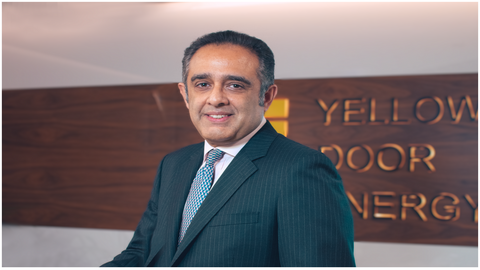RSE
Towards Net Zero and COP 28: The Role of Sustainable Finance

The growing focus on clean energy is giving rise to sustainable or green finance, say Nalin Nayyar, Chief Financial Officer, Yellow Door Energy
- As published by Utilities Middle East
The focus of investments for business traditionally has been about securing high returns, without much consideration paid to the impact on the environment.
However, growing concerns of climate change coupled with the loss of biodiversity are accelerating the drive towards conscious solutions arising from business related investments.
Organisations are also increasingly facing pressure to re-evaluate their operational framework and adopt green modes of energy to ensure long-term business sustainability.
The focus on sustainable investment has created the demand for a specialized type of financing – sustainable finance, or green finance – which serves as a catalyst for channelling capital flow towards investments that demonstrate their potential to control emissions and secure global net-zero targets.
Understanding the global need of the hour
The recently convened COP26 in Glasgow may have fallen short on the global commitment to support developing countries with $100 billion worth of climate financing, but it did give rise to a new force that is reigniting hope for decarbonisation goals. Investors – from fund managers to asset owners – are discovering lucrative opportunities in climate-related technology, causing a much-needed shift towards the $130 trillion capital required to bring the 2050 net zero targets back on track.
The shift towards climate financing as a profitable investment strategy taps into the potential of the private sector which could provide 70% of total investments required to cap global warming to 1.5°C, according to a study commissioned by the UN High Level Climate Action Champions.
Forming an ecosystem of change
The Environmental, Social, and Governance (ESG) aspects of a project are increasingly attracting influential investors. In addition, facilitators of renewable energy, like Yellow Door Energy, offer clean energy solutions to leading businesses by tapping into private financing sources, thus providing healthy returns based on long-term renewable energy contracts. The profitability and success of such projects has resulted in renewed comfort with long-term financing. This form of green financing also generates an opportunity to leave an impact and allow providers of such capital the ability to contribute to achieving their net-zero targets.
From a long-term perspective, this construct gives rise to an intertwined and collaborative ecosystem for financial institutions, investors and future-ready organizations, each committed to addressing environmental and social challenges as they look forward to greater business opportunities and higher returns.
Leading the energy transition
The UAE is in the lead as the first GCC nation to introduce a comprehensive climate action plan, further strengthened by its recently awarded rights to host the COP28 in Abu Dhabi in 2023. This milestone event will see the country march towards a refined collaboration between governments, industry and civil society to address environmental challenges and implement solutions.
The ‘UAE Net Zero by 2050 Strategic Initiative’ is its latest drive that seeks to pivot the country to a future powered by clean energy. As part of the mission, an investment of Dh600 billion has been committed to renewable energy projects that will fortify economic growth, introduce practical solutions, increase competitiveness within local industries and enhance investment opportunities.
The proposed road map is meant to achieve reduced carbon footprint by 70%, with the inclusion of 40% of individuals and corporations in its grand plan. To reach the ambitious 1.5°C, we can expect an accelerated drive to implement stringent regulations across new and existing organizations and their business models.
Final words
A majority of the world’s capital is still being channelled into fossil fuels. According to the “Banking on Climate Chaos 2021” report, investments valued at $3.8 trillion between 2016 and 2020 were invested in fossil fuel related businesses.
While a change in mindset and indeed investment policy takes time, it is important for the financial sector to consciously focus on investing in alternative energy sources such as solar and hybrid solutions. And as the concept of sustainable finance starts to become more mainstream, I urge financial institutions and businesses to act now, help in expanding this ecosystem and create resilient and sustainable long-term value creation coupled with positive environmental impact.




